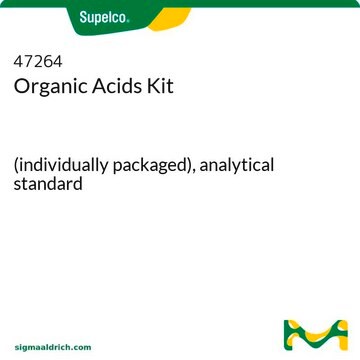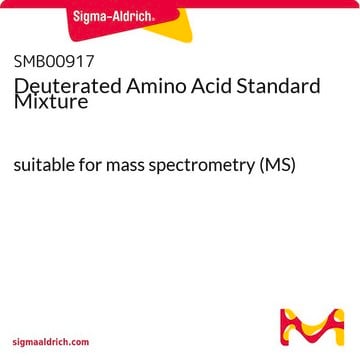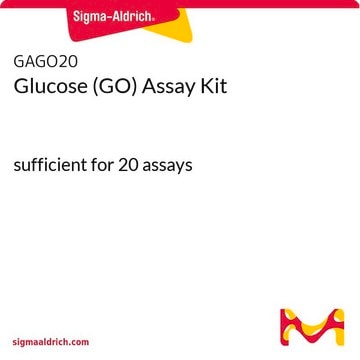Recommended Products
storage temp.
−20°C
Related Categories
Components
Other Notes
Kit Components Also Available Separately
- 158968α-D-Glucose, anhydrous, 96% 15 mgSDS
- B4501Biotin, ≥99% (HPLC), lyophilized powder 10 mgSDS
- D7137Dihydroxyacetone phosphate dilithium salt, ≥93% dry basis (enzymatic) 10 mgSDS
- F3627D-Fructose 6-phosphate disodium salt hydrate, ≥98%, amorphous powder 10 mgSDS
- F6803D-Fructose 1,6-bisphosphate trisodium salt hydrate, ≥98% (TLC) 10 mgSDS
- G6750α-D-Glucose 1-phosphate dipotassium salt hydrate, ≥99% (HPLC), BioXtra 10 mgSDS
- G7127Guanosine 5′-diphosphate sodium salt, Type I, ≥96% (HPLC) 10 mgSDS
- G7528D-(+)-Glucose, ≥99.5% (GC), BioXtra 10 mgSDS
- G7879D-Glucose 6-phosphate sodium salt, ≥98% (HPLC) 10 mgSDS
- G8877Guanosine 5′-triphosphate sodium salt hydrate, ≥95% (HPLC), powder 10 mgSDS
- K1750α-Ketoglutaric acid, ≥98.5% (NaOH, titration) 10 mgSDS
- L1750L-(+)-Lactic acid, ≥98% 10 mgSDS
- M8304Malic acid, meets USP/NF testing specifications 10 mgSDS
- O7753Oxaloacetic acid, powder, BioReagent, suitable for cell culture, suitable for insect cell culture, ≥97% (HPLC) 10 mgSDS
- P2256Sodium pyruvate, ReagentPlus®, ≥99% 15 mgSDS
- P7127Phospho(enol)pyruvic acid monopotassium salt, ≥97% (enzymatic) 10 mgSDS
- P8877D-(−)-3-Phosphoglyceric acid disodium salt 10 mgSDS
Signal Word
Danger
Hazard Statements
Precautionary Statements
Hazard Classifications
Eye Dam. 1 - Skin Corr. 1C - Skin Sens. 1 - STOT SE 2 - STOT SE 3
Target Organs
Eyes,Central nervous system, Respiratory system
Supplementary Hazards
Storage Class Code
8A - Combustible corrosive hazardous materials
Regulatory Listings
Regulatory Listings are mainly provided for chemical products. Only limited information can be provided here for non-chemical products. No entry means none of the components are listed. It is the user’s obligation to ensure the safe and legal use of the product.
EU REACH Annex XVII (Restriction List)
Certificates of Analysis (COA)
Search for Certificates of Analysis (COA) by entering the products Lot/Batch Number. Lot and Batch Numbers can be found on a product’s label following the words ‘Lot’ or ‘Batch’.
Already Own This Product?
Find documentation for the products that you have recently purchased in the Document Library.
Our team of scientists has experience in all areas of research including Life Science, Material Science, Chemical Synthesis, Chromatography, Analytical and many others.
Contact Technical Service











